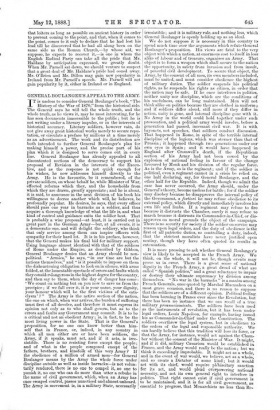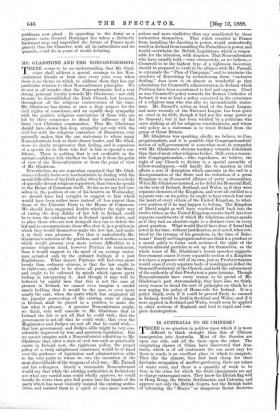GENERAL BOULANGER'S APPEAL TO THE ARMY.
IT is useless to consider General Boulanger's book, "The History of the War of 1870," from the historical side. The General says he will tell the whole truth, and the whole truth, as he views it, may be most interesting, for he has seen documents inaccessible to the public ; but he is not writing under a literary impulse, or in the interests of historical accuracy. Literary soldiers, however vain, do not give away great historical works merely to secure repu- tation, or circulate a preface by millions at a time merely as an advertisement. The work and its distribution are both intended to further General Boulanger's plan for making himself a power, and the precise part of his plan which it is designed to serve comes out in every line. General Boulanger has already appealed to all discontented sections of the democracy to support his proposal of Revision in the interests of the Execu- tive, and as the response is not quick enough for his wishes, he now addresses himself directly to the Army. He is the favourite, be it remembered, of the private soldiers, on whose behalf he, while Minister of War, effected reforms which they, and the households from which they are drawn, greatly appreciate ; and he is about, it is said, to announce in the next division of his book his willingness to decree another which will, he believes, be profoundly popular. He desires, he says, that every officer should pass one year in barracks as a soldier, and thus acquire a thorough knowledge of what the life is, and what kind of control and guidance suits the soldier best. That is probably a wise proposal—at least, it is carried out in great past in the German Army—but, at all events, it is a democratic one, and. will delight the soldiery, who think that only service among them can inspire officers with sympathy for their hard lot. It is in his preface, however, that the General makes his final bid for military support. -Using language almost identical with that of the soldiers of Rome under the Empire, as described by Gibbon, General Boulanger denies that an Army should be non- political. "Armies," he says, "in our time are but the nations themselves," and "is it possible to impose on them the disheartening obligation to look on in silence, with arms folded, at the lamentable spectacle of errors and faults which they consider dangerous in the highest degree for the country, and then say to them, when the day of danger has come : We count on nothing but on you now to save us from the precipice ; if we fall over it, it is your name, your dignity, your honour which will be the first victims of the cata- clysm ' ? " The Army is the active section of the nation, the one on which, when war arrives, the burden of suffering must first of all devolve, and therefore it must express its opinion not only as to who shall govern, but as to the errors and faults any Government may commit. It is to be a critical and not an obedient Army ; is, in fact, to be the most living power in the State. That is the General's proposition, for no one can know better than him- self that in France, or, indeed, in any country in which all men either are or have been soldiers, the Army, if it speaks, must act, and if it acts, is irre- sistible. There is no resisting force except the people ; and of what is the people composed except of the fathers, brothers, and kinsfolk of this very Army ? If the obedience of a million of armed men—for General Boulanger means by the Army the whole force under discipline outside as well as inside barracks—is not volun- tarily rendered, there is no one to compel it, no one to punish it, no one who can do more than utter a rebuke in the name of civil government, which, when an Army has once escaped control, passes unnoticed and almost unheard. The Army in movement is, in a military State, necessarily irresistible ; and it is military rule, and nothing less, which General Boulanger is openly holding up as an ideal. We do not suppose it is necessary in this country to spend much time over the arguments which refute General Boulanger's proposition. His views are fatal to the very object with which a nation, at enormous cost to itself in loss alike of labour and of treasure, organises an Army. That object is to form a weapon which shall secure to the nation the opportunity, in safety from invasion and from insult, of peaceful civil development. To secure that object, the Army, by the consent of all men, its own members included, must be united, and must consider obedience the highest of military duties. The soldier suspends his political rights, as he suspends his rights as citizen, in order that the nation may be safe. If he once interferes in politics, neither unity nor discipline, which are the conditions of his usefulness, can be long maintained. Men will not think alike on politics because they are clothed in uniform ; and if soldiers differ aloud, still more if they differ in action, unity is gone, and internal discipline gone with it.. No Army in the world could hold together under such. provocation, and a political army would involve, before a generation had passed, incessant civil war. It is with bayonets, not speeches, that soldiers conduct discussion. That happened in Rome, in spite of the terrible internal discipline of the legions, which was sterner than that of Prussia ; it happened through two generations under our own eyes in Spain ; and it would have happened in England after Cromwell's death, if the Republican section of his Army had not been cowed by the explosion of national feeling in favour of the change favoured by Monk and his division of the regular force. As is the Army, so is the regiment ; and if the soldier is political, even a regiment cannot in a crisis be relied on, one half declaring, say, for General Boulanger, and the other half for the Republic. Indeed, though we admit the case has never occurred, the Army should, under the General's theory, become useless for battle ; for if the soldier may disobey because he disapproves the internal policy of the Government, a fortiori he may refuse obedience to its external policy, which directly and immediately involves his own life and limbs. If a regiment may refuse to fire, because it distrusts the Chamber, surely it may refuse to march because it distrusts its Commander-in-Chief, or dis- approves on moral grounds the object of the campaign. There is no security for society if the soldier on service may reason upon legal orders, and the duty of obedience is the first of all patriotic duties, so controlling a duty, indeed, that the strictest moralists have never justified open mutiny, though they have often quoted its results in extenuation.
It is more pressing to ask whether General Boulanger's view is likely to be accepted in the French Army. We think, on the whole, it will not be, though events may prove us in error. There is a great sense of national dignity in the French Army, a great dread of what are called "Spanish politics," and a great reluctance to impair or destroy their ultimate supremacy by division among themselves. "No war in the barracks" is a maxim among French Generals, once quoted by Marshal Macmahon on a most grave occasion, and there is no reason to suppose that the soldiers are of a different opinion. Political feeling has been burning in France ever since the Revolution, but there has been no instance that we can recall of a true military pronunciamiento. The soldiers have been used as the instruments of revolution, but it has been under legal orders, Louis Napoleon, for example, having issued his as Commander-in-Chief under the Constitution. The soldiers overthrew the legal system, but in obedience to. the orders of the legal and responsible authority. We can hardly believe that this tradition will lose its force, or that the Army, for instance, would act against the Cham- ber without the consent of the Minister of War. It might, and if it did, military Ctesarism would be established in France, and the Army would really be the nation ; but we think it exceedingly improbable. It might act as a whole, and in the event of war would, we believe, act as a whole, and so create a Dictator of some kind ; but it would act with its chief, would require plaiscitary sanction for its act, and would plead overpowering national necessity, and not its own general right to interfere in politics. That right cannot exist if civil government is to be maintained, and it is for all civil government, as essential to progress, that Monarchists no less than Re.. publicans now plead. In appealing to the Army as a separate caste, General Boulanger has taken a distinctly backward step, and imperilled the future of France more gravely than the Chamber, with all its imbecilities and its quarrels, could do in years of sterile debating.



































 Previous page
Previous page